Rescue Dawn
 for some sequences of intense war violence and torture.
for some sequences of intense war violence and torture.
Reviewed by: Kenneth R. Morefield
CONTRIBUTOR
| Moral Rating: | Average |
| Moviemaking Quality: |
|
| Primary Audience: | Adults Teens |
| Genre: | War History Action Adventure Drama |
| Length: | 2 hr. 6 min. |
| Year of Release: | 2007 |
| USA Release: |
July 4, 2007 (NY, LA) July 13: Top 10 markets July 27: Top 50 markets |
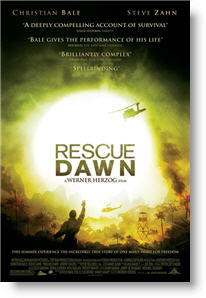
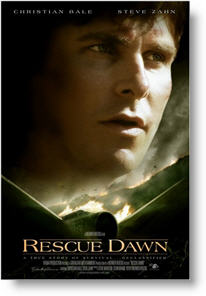
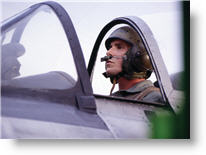
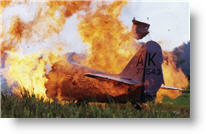
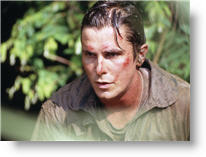
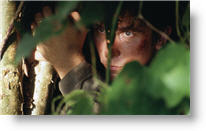
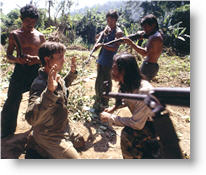
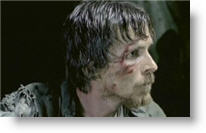
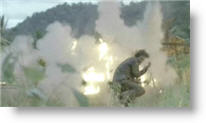
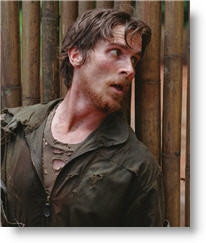
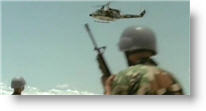
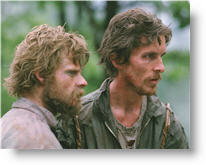
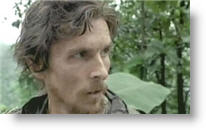
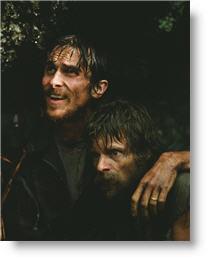

Fear, Anxiety and Worry… What does the Bible say? Answer
What about the issue of suffering? Doesn’t this prove that there is no God and that we are on our own? Answer
Does God feel our pain? Answer
The Origin of bad—How did bad things come about? Answer
What kind of world would you create? Answer
| Featuring |
|---|
| Christian Bale (“Batman Begins,” “The Prestige”), Steve Zahn, Marshall Bell, François Chau, Jeremy Davies, Craig Gellis, GQ, Zach Grenier, Pat Healy, Toby Huss, Bonnie Z. Hutchinson, Evan Jones, Abhijati “Meuk” Jusakul, Mr. Tony B. King, Mr. Richard Manning, Mr. Garrett D. Melich, Mr. Kriangsak Ming-olo, Mr. Yuttana Muenwaja, Teerawat Mulvilai, Somkuan “Kuan” Siroon, Mr. Chorn Solyda, Mr. Saichia Wongwiroj |
| Director |
| Werner Herzog (“Grizzly Man,” “Fitzcarraldo”) |
| Producer |
| Freddy Braidy, Elie Samaha, Gerald Green / Budget: $10-million (estimated) |
| Distributor |
“A true story of survival… declassified.”
Here’s what the distributor says about their film: “Based on the true story of German-born Dieter Dengler, who dreamed of being a test pilot and thus made his way to America, where he joined the military in pursuit of his obsession to fly. On his first mission in Vietnam, he is shot down and captured by Vietcong guerrillas. In the annals of history’s great escapes, there is no other story like that of Dieter Dengler, the only American to ever break out of a POW camp in the impenetrable Laotian jungle. After months plotting his getaway from a harrowing prison and a death-defying journey through some of the world’s fiercest wilderness, Dengler appeared at his first press conference looking like a dashing movie star and showing neither sentimentality nor bitterness—simply an indomitable will to survive that allowed him to triumph against impossible odds.”
At the 2006 Toronto International Film Festival, director Werner Herzog answered questions from the audience about why he had followed up his success with “Grizzly Man” by returning to material he had already fashioned into film. “Rescue Dawn” is not exactly a remake of Herzog’s 1997 documentary “Little Dieter Needs to Fly,” but it does cover mostly the same events recounted by Dieter Dengler in the earlier film, including his torture in and escape from a POW camp during the Vietnam War.
When the question of why he made the film was posed to Herzog during the audience question and answer session, he said he had “unfinished business” with the material. For example, he mentioned that “Little Dieter Needs to Fly” did not delve into the conflicts between the prisoners the way “Rescue Dawn” does. This answer was not exactly convincing, since the elements glossed over in the first film were not central to the second.
What was absolutely convincing in Herzog’s speech was the affection he expressed for Dengler. The two men apparently formed a friendship that continued after the documentary was completed. Given the fact that Dengler passed away in 2001, one wonders if Herzog was using some of his cachet to make a bigger memorial to his friend than that provided by the relatively obscure documentary. If so, one might wish he had encouraged people to watch the documentary instead of remaking it, for the latter film loses much of the wonder and most of the spiritual questioning that Dengler’s own voice brought to the former.
Saying so is a risky proposition. Those with whom I discussed the film in Toronto were generally disappointed, but early reviews have been strongly favorable. When one is dealing with a director like Herzog, it is easy enough to assume that mostly it will be his fans and other cinephiles who actively seek out his films, while the multiplex crowd won’t be likely to see them unless they get strong word of mouth. Christian Bale’s presence may bring some viewers new to Herzog to “Rescue Dawn,” but this role is anything but glamorous. Bale and Herzog bantered in Toronto about the rugged conditions surrounding the making of the film—Bale lost weight, braved the elements, ate maggots and apparently got physically beat up replicating some of Dengler’s tortures; Herzog apparently spent hours in the water to get the right angle to shoot some scenes.
Two uncompromising perfections clearly found kindred spirits with whom to push one another in the pursuit of great art, but none of the method acting could replicate the raw emotion in Dengler’s voice during “Little Dieter Needs to Fly” when he reenacted his march to the prison camp. Nor could “Rescue Dawn” recreate the dissonance created by listening to Dengler calmly rattle off the various tortures to which he was subjected.
Narrative films are very, very literal, and the emotions one feels in watching events unfold seldom are the same as those in hearing someone talk about them in retrospect. Much of the wonder in “Little Dieter” comes from the conflict the audience feels between its mounting incredulity at Dengler’s survival and his physical presence in the film. For an audience weaned on Hollywood escape movies, though, that incredulity never materializes during “Rescue Dawn,” and we are left with a somewhat generic Hollywood prison escape film carrying the stamp “based on a true story”—an inadequate substitute for hearing the man himself tell his own story.
The literalness of the visual image also makes it difficult to deal with much of the spiritual ambiguity that was an integral part of the earlier documentary. Early in “Little Dieter Needs to Fly” Dengler is drawn to and describes an apocalyptic painting and how part of its caption—“Death did not want him”—symbolized his experience. In another instance, he speaks in the same matter-of-fact voice about seeing an apparition. While the skeptics in the audience may hear the supernatural parts of Dengler’s story and have doubts (or even construct plausible explanations for the phenomenon he describes), the film itself invites the audience to at least contemplate the significance of Dengler’s experiences from a spiritual perspective. Those watching the same material in narrative form rarely experience the same level of ambiguity. The image in the frame takes on the air of ontological reality even if it were to be framed as the subjective vision of the protagonist (which it isn’t in “Rescue Dawn.” As a result, “Rescue Dawn” has little of the majesty and mystery that pervades “Little Dieter Needs to Fly.”
A quick footnote for Christian viewers: I screened the film over six months ago, and I did not know I would be reviewing it for a Christian publication at that time, so I did not pay close attention to issues of language or sexuality. The violence is intense and disturbing, though it was not depicted in the sadistically graphic mode common to contemporary horror (and some action) films. While I don’t recall the language being particularly crude or profane, bear in mind that this is a prisoner of war film.
Fans of Herzog and/or Bale might be curious to check out “Rescue Dawn,” but for most viewers renting “Little Dieter Needs to Fly” from Netflix or Blockbuster would probably be a more rewarding experience.
Violence: Heavy / Profanity: Moderate / Sex/Nudity: Minor
See list of Relevant Issues—questions-and-answers.


The acting and cinematography raised this film beyond many that share its genre, but the direction was not up to what I expected from Herzog. The pacing felt rushed, and the ending felt contrived (although I have heard it is accurate to the real life experiences of Dengler). I have also heard Davies' character (which is supposed to be based on an actual POW) is portrayed in a false, negative light. If you accept this story as “based” on a true story, the artistic license should not take away from the quality of the film.
The film earns its R-rating because of some shocking graphic violence—some of which is too integral to the plot to divulge here. The language was not extreme, but the Lord’s name is taken in vain on several occasions (I recall worse in the PG-13 “Disturbia”). There is no nudity or even implied sex. As expected if you have read anything regarding the movie, the major theme is the indomitable human spirit. Minor themes are friendship and trust.
Average / 3½
My family has created a Web site—www.rescuedawnthetruth.com—to help share the true story behind the movie Rescue Dawn. Please feel free to visit this site and share it with your Web site visitors. We also encourage you to “google” Gene’s name, as well as the names of the other POWs in the movie to learn more. Our prayer chains have been working hard to spread the true story behind “Rescue Dawn” so that people can make a good decision before they go to see the movie. We would appreciate your consideration for sharing our Web site address with others. Thank you.
Extremely Offensive / 3
Back to the film of RESCUE DAWN. It is about the plight of Dieter Dengler (Christian Bale), a downed U.S. Navy pilot. This was before the U.S. entry into the Vietnam War, and Dengler would have had it easy if he just signed a false document, but he is a true patriot. From here, we see the harrowing treatments of POWs. Unlike in today’s society with high powered camera lenses in the hands of watch organizations, POWs suffered painful ordeals of health, malnutrition, physical abuse, and many other mistreatments. Dengler is the new guy with the optimistic dream of escape and freedom, where-as, his fellow inmate were beaten and down-trodden. One even shows signs of insanity.
The group dispersed once they escaped, and it’s Dengler and Duane Martin (Steve Zahn) teaming and trekking through the thick foliage of Laos. Steve Zahn, mostly known for his comical antics, turns a remarkable nuisance performance here.
I still have problem with the ending, but overall the film was engaging and ultimately triumphant. Even with the subtitle turns on, there were no captions for the Laotian dialogues, this was the first film where I did not have to interpret for my father, who speaks Laotian. It’s the other way around.
Moral rating: Good / Moviemaking quality: 4½
Good / 5
Good / 4½


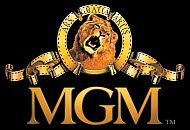
My Ratings: Better than Average / 4½